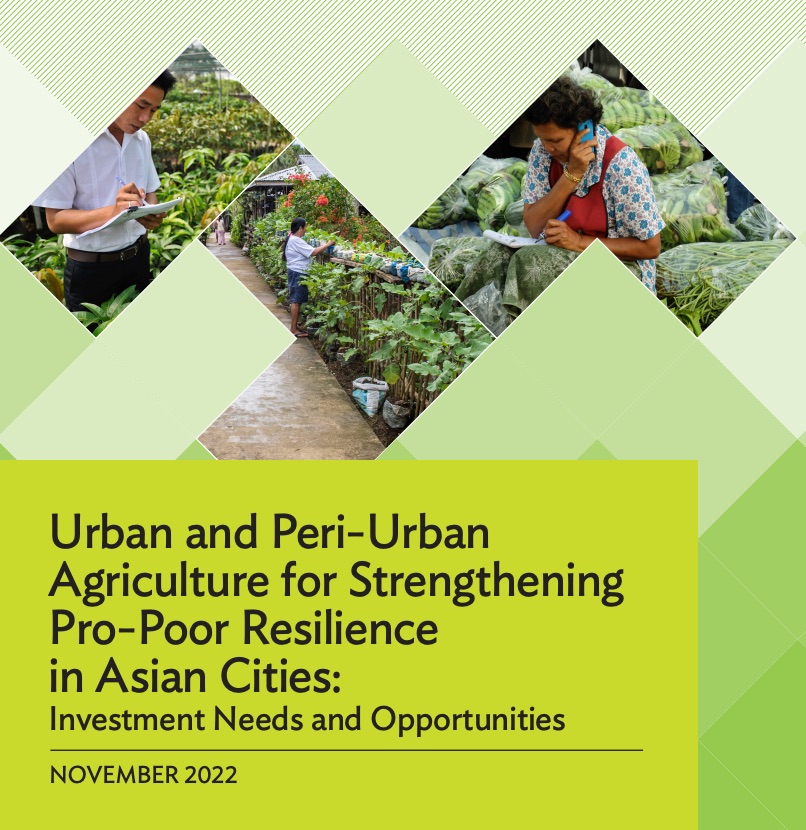post-type: Publications
-
Enhancing international cooperation and development through Urban Agriculture (UA)
As part of the European Forum on Urban Agriculture (EFUA), RUAF and Aeres University of Applied Sciences Almere developed a new policy brief that outlines how to scale the impact of Urban Agriculture through stronger international cooperation. This brief identifies 8 key barriers that currently limit the development and full valorisation of urban agriculture and…
-
The Milan Urban Food Policy Pact & climate action: Integrating mitigation and adaptation into urban food policies
This document introduces a set of updated and newly developed MUFPP actions and indicators designed to more effectively incorporate climate considerations into urban food policies. These recommendations are intended as a complementary resource—providing a flexible set of voluntary actions that cities can adapt to their unique contexts, taking into account their varying regulatory, economic, and environmental…
-
GUPAP Community-led Action in crisis (CLA)
This one-pager explains the approach structure and mechanisms of the Community-Led Solidarity Marketing Campaigns (CLSMCs) introduced by the the Gaza Urban and Periurban Agriculture Platform (GUPAP) in 2022 to enhance the resilience for Gaza urban women agriprenuers.
-
Fact sheet on women agripreneurs’ rights from a food sovereignty perspective
This fact sheet produced by the Gaza Urban and Periurban Agriculture Platform (GUPAP) provides context on agriculture in the Gaza strip before the intense war in Gaza since late 2023, and the roles and contribution of women in the local food system. It summarizes the challenges facing women agripreneurs.
-
Fact sheet on enhanced market share of urban women agripreneurs: Opportunities, barriers and way forward
This fact sheet describes the major opportunities to enhance the ole of women agripreneurs in Gaza’s food sector, defining major barriers that limit their access to higher market share and intervention strategies to overcome them.
-

Urban and Peri-Urban Agriculture for Strengthening Pro-Poor Resilience in Asian Cities: Investment Needs and Opportunities
This report responds to several trends in Asia and the Pacific which have been increasingly recognized in the region. Together with rising urban poverty, the number of urban residents facing food and nutrition insecurity is increasing despite spending the majority of their earnings on food purchases. The COVID 19 pandemic has added greater stress to…
-
Agency and advocacy in the food systems of the majority
Interventions to improve the sustainability and nutrition of food can be misdirected when based on assumptions about people’s priorities and level of knowledge. When citizens have the capacity to act on their own priorities — in other words when they have agency — there is the potential to achieve better and more durable outcomes. This…
-
Multi-actor initiatives in action: Lessons from the Sustainable Diets for All programme
This reflection paper documents the results of three multi-stakeholder initiatives (MAIs) that have come about through Hivos and IIED’s Sustainable Diets for All programme: the Food Parliament in Buikwe, Uganda; the Food Change Lab in Zambia; and the La Paz Food Council in Bolivia. The paper aims to strengthen our understanding of MAIs by showing…
-
Food systems assessment summary
A holistic food system approach involving all stakeholders is key to solving the urgent and interconnected challenges that our world is currently facing. A new retrospective study shows the degree to which the program’s Food Change Labs in Zambia and Uganda used systems thinking to successfully kick-start the transformation of local food systems in these…
-
Sustainable diets in the informal economy
Informal food systems contribute to the food and nutrition security of hundreds of millions of people around the world, particularly in the global South. But the concept of sustainable diets – which brings together global priorities around food and nutrition security, environmental protection and economic affordability – is built around the formal food systems of…
